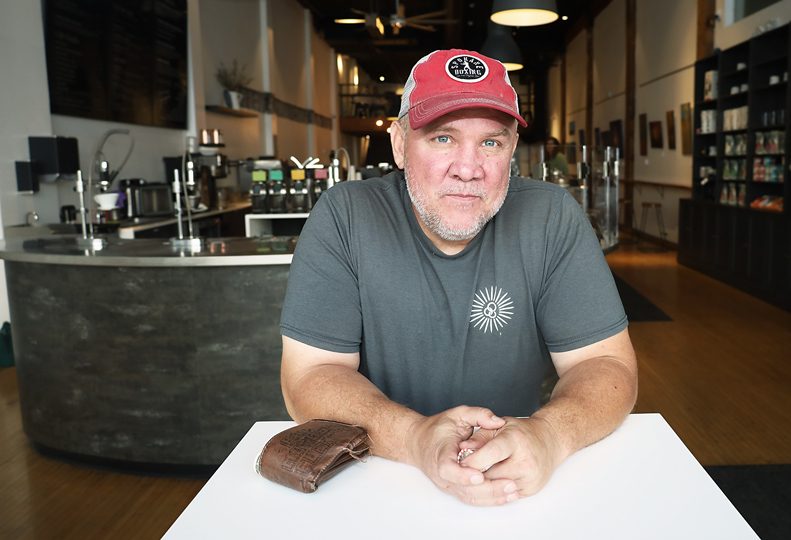Every year for the past decade, Spokane Boxing Gym LLC has grown a little bigger, drawn a little more attention, and pulled in students from farther afield. For owner Rick Welliver, the numbers matter less than witnessing and being part of the transformation of many of his students.
“Service to others is the rent that we pay to occupy space here on this planet,” Welliver says. “You don’t want to do that; you’re just wasting time.”
Spokane Boxing Gym is located at 115 S. Jefferson, in downtown Spokane. Inside the 4,000-square-foot space, athletes from diverse backgrounds train alongside one another. On any given day, a police officer might trade rounds on the heavy bag next to a teenager from juvenile court, while a retiree works out next to a college kid who drove in from Pullman, Washington. Refugees, young professionals, and people in recovery all find their way to Spokane Boxing Gym, drawn in less by competition than by community, Welliver contends.
As a Spokane native who grew up in the Hillyard neighborhood, Welliver, 52, is attuned to the struggles of working-class youth and views his business as a vehicle that can level the playing field, giving everyone who walks through his doors the chance to rebuild confidence, discipline, and purpose.
Welliver says he keeps membership affordable for the gym’s 75 members; those in recovery can pay with sobriety chips. The gym also has contracts with juvenile courts, Excelsior Wellness, Crosswalk Youth Shelter, Morning Star Boys’ Ranch, and Daybreak Youth Services.
Among the boxing gym’s success stories is that of 21-year-old Yakobo Mleha, Welliver says. As a child in Tanzania, Mleha broke his lower leg, but he never fully recovered, leaving him with an S-shaped shin. When his family moved to the U.S., doctors at Shriners Hospitals for Children worked to straighten and mend his broken tibia, followed by extensive physical therapy.
About four years ago, Mleha discovered boxing and, under the tutelage of Welliver, has officially entered the sport as an amateur. Last month, he competed in the Pendleton Boxing Classic tournament, hosted by the Pendleton Boxing Club, in Oregon. Mleha returned to Spokane a champion, winning both of his fights during the two-day event.
It’s stories like these, boosted through social media platforms, that have spurred further interest and attention in Spokane Boxing Gym, Welliver says.
“Boxing is the rare sport that changes lives,” Welliver says. “Boxing not only builds character like any athletic endeavor would, but boxing more than anything reveals character. And it shapes people. It’s quite magical. Boxing can give strength to the weak, confidence to the shy, and make your kid feel like they can do anything in the wide world. How many other sports can do that?”
Welliver’s pugilistic passion for the sport and its ability to change people’s lives is tied to his own success and personal history. He comes from a boxing family in which his great-grandfather and grandfather both boxed. As a kid in Hillyard, he grew up watching his father and uncles’ boxing and was hypnotized by the sounds and camaraderie of the gyms.
Within a few months of training as a teen, he won his first Golden Gloves championship and had his professional debut in 1995. He opened his boxing gym in 2001 in an abandoned gym on Sprague Avenue, initially as a place for him and his brothers to train. However, the business evolved into a career, allowing Welliver to easily step into his next venture after he retired from boxing in 2005.
He fought his last match at the grand opening of Northern Quest Casino and walked away with a win.
“I was able to get myself in shape and beat the guy that beat me a few years before,” Welliver says. “I feel good. I went out on a win. A lot of guys don’t do that.”
As Spokane continues to grow, Welliver says he wants to stay committed to helping low-income, disadvantaged, and at-risk youth. He is critical of what he says is a lack of accessible resources for youth in the city, which he says has only led to increased mental health issues in teens.
“There’s a population of kids that want to have more options and need more options,” he says. “That’s going to be my focus in the next 10 years, which is sort of leveling the playing field. I think we’re making moves in the right direction. We just need to get more wraparound services in this town. We need to identify mental health as the number one thing ailing our town, which in turn is ailing our country.”

